The 1st Vienna Symposium on Faith & Management just finished. It was wonderful co-organizing the event with Martin Steinbereithner and Wolfgang Mayrhofer at Vienna University of Economics & Business. Great conversations, paper presentations, and keynotes by David Miller and Dorothea Alewell. Much more to come, I hope.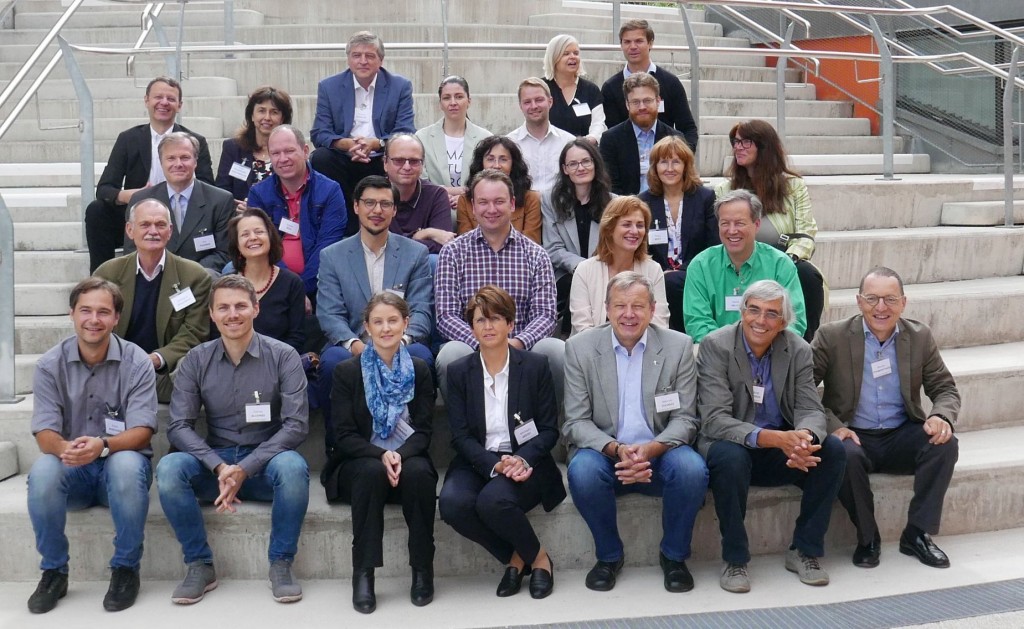
New scientific network “Grand Challenges & New Forms of Organizing”
The German Research Foundation has approved funding for our scientific network. Over the next 3 years the network studies the relationship between societal grand challenges and new forms of organizing.
funding for our scientific network. Over the next 3 years the network studies the relationship between societal grand challenges and new forms of organizing.
Grand challenges represent fundamental, global societal challenges of ecological or social nature that require coordinated and collective efforts of multiple actors, including business firms, governments, civil society, and academia. Solving problems like global poverty, climate change or precarious working conditions that emerged as an effect of digitalization and the “sharing economy” are key challenges both for researchers as well as practitioners. At the same time, opportunities arise when considering the role of new technologies and approaches to address grand challenges. They enable the emergence of new forms of temporary, flexible and fluid organizing that may be necessary to discern possible solutions. Yet, academic research that examines the reciprocal relationship between grand challenges and new forms of organization is still nascent.
This network takes an organizational theory perspective on the reciprocal relationship by asking two interdependent research questions. The first question is: What is the relationship between new forms of organizing and grand challenges? Our aim to theorize this relationship is not without complications: On the one hand, examining new forms of organizing in light of grand challenges requires a high degree of theoretical and methodological pluralism in our research. On the other hand, devising practically and managerially relevant solutions requires some degree of consensus among the academic community. The second research question that this network therefore seeks to address is: How can scientific research develop consistent practical implications despite the theoretical and methodological pluralism that pervades organizational research?
Graphical overview: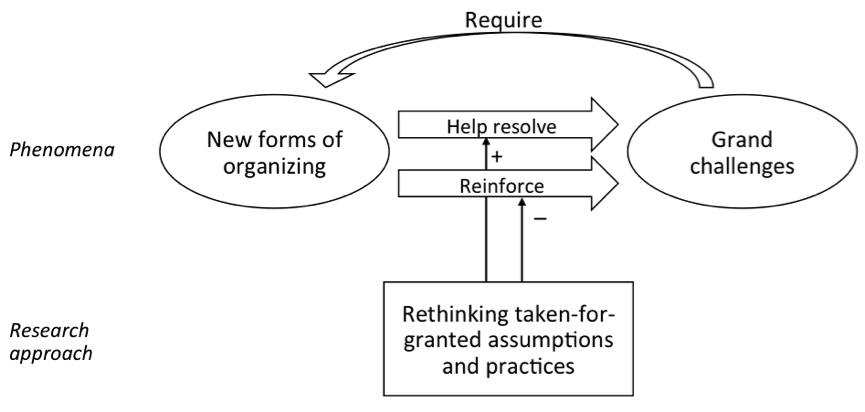
Further information:
|
Project Duration |
June 2018 – May 2021 |
|
Funding Agency |
Deutsche Forschungsgemeinschaft (DFG) |
|
Principal Investigator |
Dr. Ali Aslan Gümüsay |
|
Cooperation Partners |
Dr. Emilio Marti |
|
Network Members |
Dr. Marlen de la Chaux |
An organizational perspective on grand challenges
I recently spoke about an organizational perspective on grand challenges for the science platform sustainability 2030. My talk covered issues such as sustainable development goals, sharing economy, organizational hybridity, new forms of organizing and collaboration as well as robust action strategies.

©WPN2030
Religions in moral theories of leadership
New article “Embracing religions in moral theories of leadership” published in Academy of Management Perspectives.
Abstract: Religions are social constituents of present 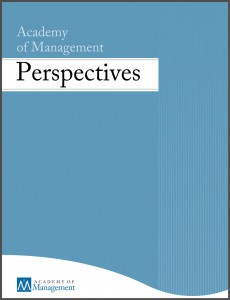 societies that need to be integrated into theories of leadership. In this article, I outline how three distinct characteristics, particularly present in Abrahamic religions, can significantly impact leadership principles and practices: a belief in the existence of and relationship to a God, the faith in and pursuit of a hereafter purpose, and the belief in and attempted adherence to a sacred scripture. Subsequently, I classify two approaches to examine their impact on leadership: a scripture-based and an empirical-based lens. I then highlight how the distinct characteristics can either inform and blend into or transform and modify moral theories of leadership.
societies that need to be integrated into theories of leadership. In this article, I outline how three distinct characteristics, particularly present in Abrahamic religions, can significantly impact leadership principles and practices: a belief in the existence of and relationship to a God, the faith in and pursuit of a hereafter purpose, and the belief in and attempted adherence to a sacred scripture. Subsequently, I classify two approaches to examine their impact on leadership: a scripture-based and an empirical-based lens. I then highlight how the distinct characteristics can either inform and blend into or transform and modify moral theories of leadership.
This figure offers a graphical summary:
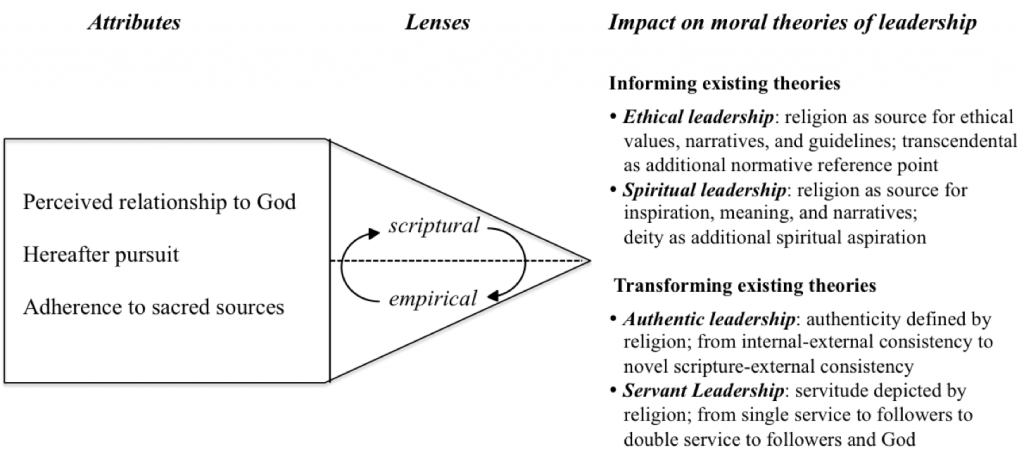
The Religious Institutional Logic
Happy to announce that the article “The Potential for Plurality and Prevalence of the Religious Institutional Logic” has been published at Business & Society.
Religion is a significant social force on organizational practice yet has been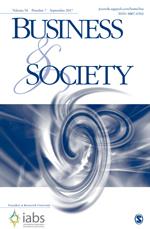 relatively underexamined in organization theory. In this article, I assert that the institutional logics perspective is especially conducive to examine the macrolevel role of religion for organizations. The notion of the religious logic offers conceptual means to explain the significance of religion, its interrelationship with other institutional orders, and embeddedness into and impact across interinstitutional systems. I argue for intrainstitutional logic plurality and show that specifically the intrareligious logic plurality has been rather disregarded with a relative focus on Christianity and a geographical focus on “the West.” Next, I propose the concept of interinstitutional logic prevalence and show that the religious logic in particular may act as a metalogic due to its potential for uniqueness, ultimacy, and ubiquity. Through illustrations from Islamic Finance and Entrepreneurship, I exemplify implications of logic plurality and prevalence for organizations and societies.
relatively underexamined in organization theory. In this article, I assert that the institutional logics perspective is especially conducive to examine the macrolevel role of religion for organizations. The notion of the religious logic offers conceptual means to explain the significance of religion, its interrelationship with other institutional orders, and embeddedness into and impact across interinstitutional systems. I argue for intrainstitutional logic plurality and show that specifically the intrareligious logic plurality has been rather disregarded with a relative focus on Christianity and a geographical focus on “the West.” Next, I propose the concept of interinstitutional logic prevalence and show that the religious logic in particular may act as a metalogic due to its potential for uniqueness, ultimacy, and ubiquity. Through illustrations from Islamic Finance and Entrepreneurship, I exemplify implications of logic plurality and prevalence for organizations and societies.
Inhibitors to entrepreneurial competencies
Delighted to announce that the article “Individual and organizational inhibitors to the development of entrepreneurial competencies in universities” co-authored with Thomas Bohné finally got published at Research Policy.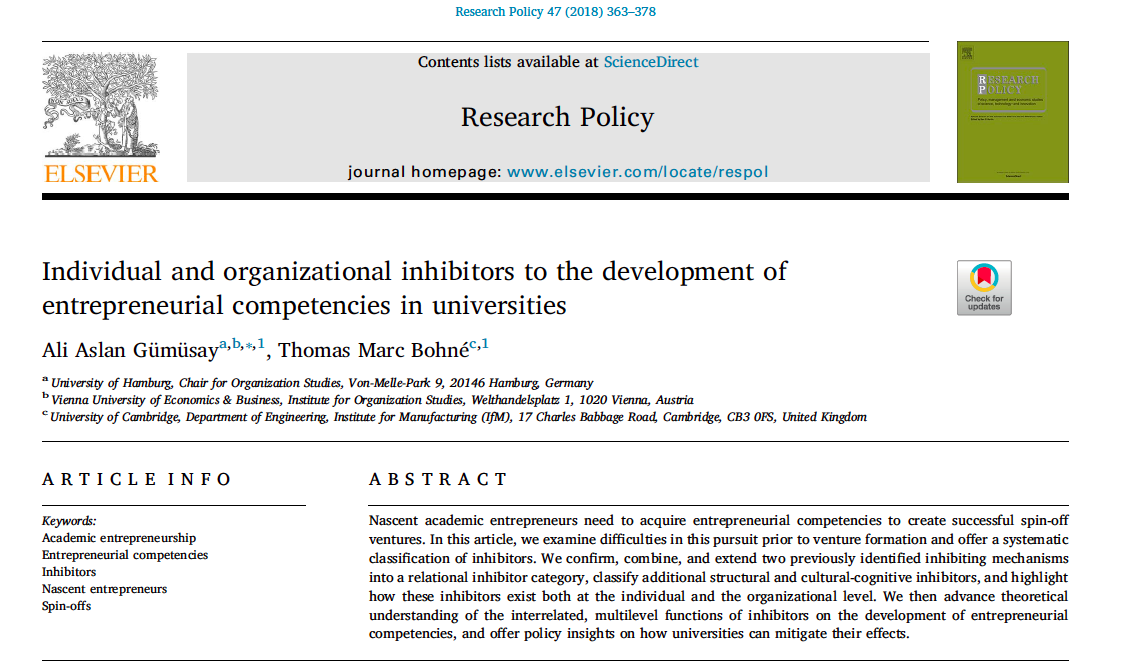 The article:
The article:
- Studies inhibitors to nascent academic entrepreneurs’ development of entrepreneurial competencies.
- Classifies inhibitors into relational, structural, and cultural-cognitive categories.•
- Shows that inhibitors exist both at individual and organizational levels.
- Advances theoretical understanding of the interrelated and multilevel functions of inhibitors.
- Suggests as policy implications a comprehensive yet decentralized approach for the development of entrepreneurial competencies.
Unpacking entrepreneurial opportunities
The paper “Unpacking entrepreneurial opportunities: an institutional logics perspective” has just been published in Innovation: Organization & Management. The article can be found here.
Abstract: Taking into account the institutional context, I refine and broaden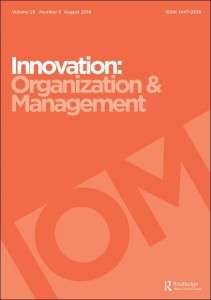 the concept of entrepreneurial opportunities by introducing micro-level evaluative criteria based on underlying macro-level institutional logics. The existing focus on so-called lucrative opportunities, which is implicitly based on a market logic, narrows the overall actual set of potential opportunities, and neglects what I call the opportunity–entrepreneur desirability nexus. Enterprising individuals evaluate and pursue entrepreneurial opportunities based on various and frequently combined underlying institutional logics. The extensive institutional theory literature on managing diverse and sometimes contradictory institutional demands, for instance in the pursuit of hybrid ventures, thus offers theoretical insights that are appropriate and expedient for the analysis and theoretical advancement of the entrepreneurial opportunity notion.
the concept of entrepreneurial opportunities by introducing micro-level evaluative criteria based on underlying macro-level institutional logics. The existing focus on so-called lucrative opportunities, which is implicitly based on a market logic, narrows the overall actual set of potential opportunities, and neglects what I call the opportunity–entrepreneur desirability nexus. Enterprising individuals evaluate and pursue entrepreneurial opportunities based on various and frequently combined underlying institutional logics. The extensive institutional theory literature on managing diverse and sometimes contradictory institutional demands, for instance in the pursuit of hybrid ventures, thus offers theoretical insights that are appropriate and expedient for the analysis and theoretical advancement of the entrepreneurial opportunity notion.
Die Rolle von Religionen in der Wirtschaft
Artikel aus der Zeitschrift Bibel & Liturgie hier zum Download
Die Thematik von Religionen in der Wirtschaft ist heute 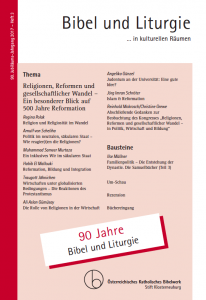 weitestgehend ein Tabu. Über Religion redet man nicht. Man schweigt sich aus. Gleichzeitig werden Spiritualität, Meditation und Yoga salonfähig. Sie versuchen sich als mögliche Alternativen für Sinnstiftung und Orientierung in einer chaotischen und komplexen Welt. Doch das Thema Religion scheint nicht ausgestanden zu sein. Im Gegenteil: Es beherrscht den politischen Diskurs, spaltet Gesellschaften und Gemeinschaften, ist fast omnipräsent in den Medien. (…)
weitestgehend ein Tabu. Über Religion redet man nicht. Man schweigt sich aus. Gleichzeitig werden Spiritualität, Meditation und Yoga salonfähig. Sie versuchen sich als mögliche Alternativen für Sinnstiftung und Orientierung in einer chaotischen und komplexen Welt. Doch das Thema Religion scheint nicht ausgestanden zu sein. Im Gegenteil: Es beherrscht den politischen Diskurs, spaltet Gesellschaften und Gemeinschaften, ist fast omnipräsent in den Medien. (…)
Der Artikel ist wie folgt gegliedert: Zunächst mache ich einen Schwenker in die Wirtschaftswissenschaft, genauer Betriebswirtschaftslehre, und die annähernde religiöse Abstinenz in ihrer Lehre und Forschung. Im Anschluss befasse ich mich mit der Rolle von Religion in der Wirtschaft und werde hier auf zwei Arbeiten von mir als Beispiele eingehen: eine zum Thema Religion und Führung und eine zum Thema Islam und Unternehmertum. Schließlich unterbreite ich einige Vorschläge zum Umgang mit Religion, die sich auf die Praxis, Lehre und Forschung beziehen.
Religion, Politics and Leadership
Federal elections in Germany will take place in a few days on the 24th of September. Around 61.5 million Germans will vote for their political representation in national parliament. For the first time since the end of the Second World War the “Alternative for Germany”, a party that many consider right-wing extremist, is very likely to make it into parliament. With campaign slogans like: “Burka? We prefer bikinis.” it tries to make Islam a divisive issue. A couple of weeks later on the 15th of October, Austria will also elect a new national parliament. The Freedom Party of Austria uses the topic of Islam in its campaign, too. Religion and in particular Islam are recurring issues in political debates.
In the recent TV duel between the two main contenders for German chancellor, the candidates were asked whether they had gone to church in the morning. Both Schulz and Merkel started their sentence with “I was not today…”, to continue with mentioning some religious institutional practices. This followed some social media uproar with many challenging that this kind of question was asked in the first place.
Religion is pervasive, yet elusive
Whether the question was appropriate and useful or not, the reactions show that religion is a contested issue. Pervasive, yet elusive. The largest party in German parliament has the C for Christianity in its name. Angela Merkel is the daughter of a pastor. The former president of Germany, Joachim Gauck, who retired a couple of months ago, is a trained pastor himself. His successor Frank-Walter Steinmeier is a devout Christian, too.
When we look over the Atlantic, we recently witnessed some religious leaders in a group prayer laying hands on Donald Trump reiterating their support. Mike Pence, the Vice-President, is a devout Christian, whose beliefs strongly impact his policy views. Other leaders around the world stress their religiousness and how it impacts their policies and way of life.
More generally, a PEW (2015) study shows that around 6 billion or 84% of the world population is somewhat religiously affiliated. This number is expected to grow both in absolute and relative numbers to over 8 billion or 87% of the world population by 2050. The philosopher Jürgen Habermas (2001) speaks of a “post-secular society” and the theologian Paul Tillich (1957) calls faith an “ultimate concern”. All in all, this highlights that we should not ignore faith, but rather engage with religion both critically and constructively.
Religion – a double-edged sword for leaders
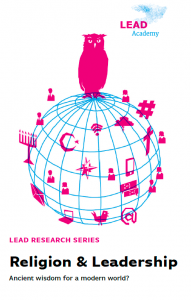 However, we do not know much about how religious beliefs impact leaders. I have zoomed in on this issue in a study with Christian, Jewish and Muslim leaders entitled “Religion & Leadership”. The study illustrates that religion is a double-edged sword that can cause both harm and good in and for leaders and beyond. Potential pitfalls are worldly negligence, non-critical reasoning, exclusivity claim and a belief in divine right. Potential opportunities are personal harmony, deeper meaning, social caring and lived values. If pitfalls are overcome and opportunities embraced, religion can be an anchor and compass for individuals, organizations, and societies in a complex world.
However, we do not know much about how religious beliefs impact leaders. I have zoomed in on this issue in a study with Christian, Jewish and Muslim leaders entitled “Religion & Leadership”. The study illustrates that religion is a double-edged sword that can cause both harm and good in and for leaders and beyond. Potential pitfalls are worldly negligence, non-critical reasoning, exclusivity claim and a belief in divine right. Potential opportunities are personal harmony, deeper meaning, social caring and lived values. If pitfalls are overcome and opportunities embraced, religion can be an anchor and compass for individuals, organizations, and societies in a complex world.
Notable Works Compilation

The Said Business School community collected notable works. My contributions are comments on “Leisure, the basis of culture” and “Siddhartha”.
Peter Tufano, Dean: “The compilation – like its predecessor, Critical Thinking 2012 – takes as its starting point the premise that the way that a community comes together is not determined by individuals’ qualifications, skills, or research profiles, but by their ability and willingness to share the way they think and feel, especially about the ideas that have profoundly influenced them.”

